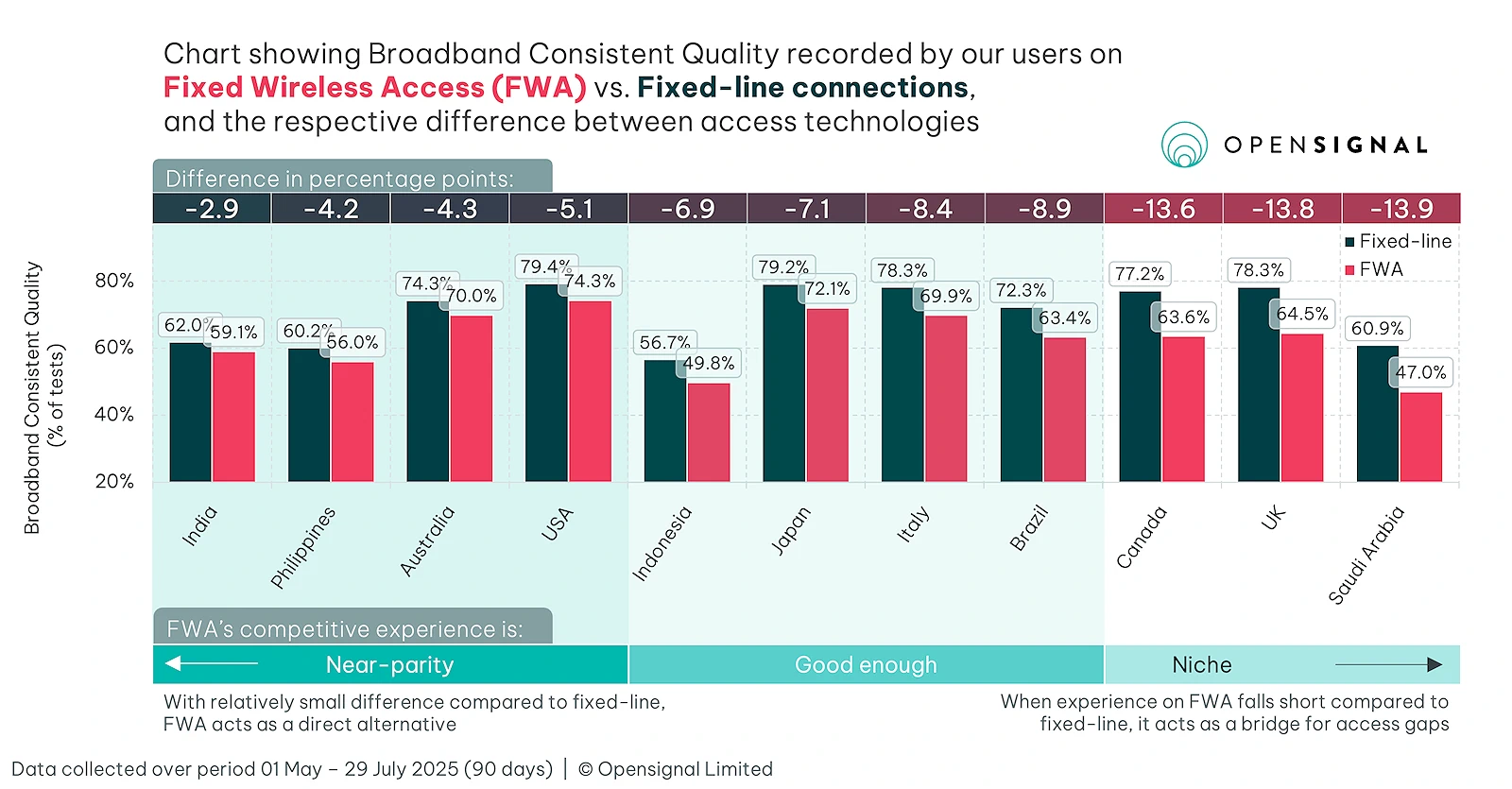Opensignal Examine Performance Gap Between Fixed Line and Wireless Broadband

Network benchmarking firm Opensignal, which gathers crowdsourced data from consumer speedtests via its App, has today published a new report that attempts to identify how far behind fixed wireless broadband (FWA) networks are in terms of performance and quality vs modern fixed line networks between 11 different countries. The gap is biggest in countries like the UK.
In order to conduct this study, Opensignal appears to have looked at the gap in their Broadband Consistent Quality metric between the two technologies, which measures a mix of key performance indicators, including download and upload speed, latency, jitter, packet loss and time to first byte etc. The metrics are represented as a percentage of users’ tests that have met the minimum recommended performance thresholds.
However, while they’ve defined “Fixed-Line” as broadband delivered through fibre (FTTP), DSL, or cable (HFC), the definition for “Fixed Wireless Access” has been limited to services operating on 4G (LTE) and 5G technologies using licensed spectrum, thereby excluding a number of wireless ISPs using unlicensed spectrum. In other words, this will catch Three UK’s 5G based home broadband service, but not providers using higher frequency mmW style mesh networks or WiFi bands (e.g. Airband).
Advertisement
Given the above caveat, it’s perhaps better to think of the results as being less a reflection of fixed line vs FWA and more a reflection of fixed line vs 4G/5G mobile broadband. As usual, this is going to be heavily influenced by what sort of spectrum bands network operators have access to in each market, as well as issues of backhaul capacity and market demand.
The Results
The study found that in countries like the USA and India, where mobile operators have used wireless connectivity as a true growth engine, FWA networks scored only around 5 percentage points below (-5pp) fixed-line for performance. By comparison, the markets where FWA remains niche, including Brazil, the United Kingdom (-13.8pp), and Canada, have some of the biggest performance gaps (fixed line is clearly the dominant force here).

The results found that, across all markets, FWA is seeing a larger decline in performance during times of peak usage than fixed-line, although the impact varies. The USA and India have maintained an FWA congestion curve that is comparable to fixed-line. By contrast, in markets like the UK, Canada, Indonesia and the Philippines, “structural limitations in spectrum availability, backhaul capacity, and overall network resources create systemic bottlenecks – limiting FWA’s growth potential“.
Advertisement
FWA remains a niche part of the broadband market in the UK, which is dominated by fixed line broadband networks. The opportunities for growth are likely to shrink as the expansion of multi-gigabit capable Fibre-to-the-Premises (FTTP) lines continue toward nationwide (c.99%) coverage by the government’s 2032 target (FTTP alone already reaches around 80% of UK premises).
However, Opensignal believes that the UK’s upcoming mmWave auction of the higher frequency 26GHz and 40GHz bands for 5G could inject new momentum into fixed wireless, not least by enabling significantly faster services that compete more directly with fibre. The problem with this view is that such bands are more intended for urban areas when looking at 5G, whereas most true FWA providers usually focus on the rural niche. But 5G based FWA in urban areas might become more attractive.
Overall, the study’s inability to cover the full range of FWA networks does rather limit its usefulness, since 4G/5G mobile based FWA often isn’t exactly comparable to true FWA networks that usually require the installation of specialised antenna and allow for more advanced features (Static IPs etc.). True FWA networks are often also better able to guarantee a certain level of performance.
Mark is a professional technology writer, IT consultant and computer engineer from Dorset (England), he also founded ISPreview in 1999 and enjoys analysing the latest telecoms and broadband developments. Find me on X (Twitter), Mastodon, Facebook, BlueSky, Threads.net and Linkedin.
« Virgin Media UK and Nexfibre Extend Full Fibre to 13,000 Homes in Sheffield






















































Comments are closed